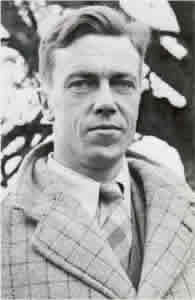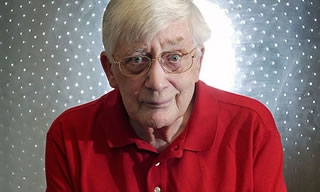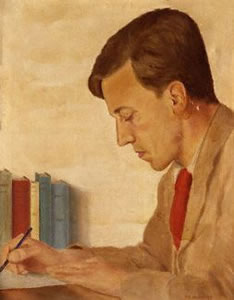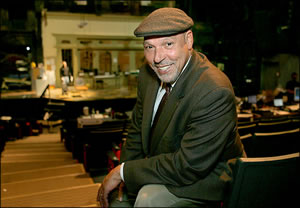De Schotse dichter en vertaler Edwin Morgan werd geboren in Glasgow op 27 april 1920. Zie ook alle tags voor Edwin Morgan op dit blog.
Strawberries
There were never strawberries
like the ones we had
that sultry afternoon
sitting on the step
of the open french window
facing each other
your knees held in mine
the blue plates in our laps
the strawberries glistening
in the hot sunlight
we dipped them in sugar
looking at each other
not hurrying the feast
for one to come
the empty plates
laid on the stone together
with the two forks crossed
and I bent towards you
sweet in that air
in my arms
abandoned like a child
from your eager mouth
the taste of strawberries
in my memory
lean back again
let me love you
let the sun beat
on our forgetfulness
one hour of all
the heat intense
and summer lightning
on the Kilpatrick hills
let the storm wash the plates
Glasgow Sonnet I
A mean wind wanders through the backcourt trash.
Hackles on puddles rise, old mattresses
puff briefly and subside. Play-fortresses
of brick and bric-a-brac spill out some ash.
Four storeys have no windows left to smash,
but the fifth a chipped sill buttresses
mother and daughter the last mistresses
of that black block condemned to stand, not crash.
Around them the cracks deepen, the rats crawl.
The kettle whimpers on a crazy hob.
Roses of mould grow from ceiling to wall.
The man lies late since he has lost his job,
smokes on one elbow, letting his coughs fall
thinly into an air too poor to rob.
Edwin Morgan (Glasgow, 27 april 1920)
De Brits-Ierse dichter Cecil Day Lewis werd geboren in Ballintogher, Ierland, op 27 april 1904. Zie ook alle tags voor Cecil Day Lewis op dit blog.
Come, live with me and be my love
Come, live with me and be my love,
And we will all the pleasures prove
Of peace and plenty, bed and board,
That chance employment may afford.
I’ll handle dainties on the docks
And thou shalt read of summer frocks:
At evening by the sour canals
We’ll hope to hear some madrigals.
Care on thy maiden brow shall put
A wreath of wrinkles, and thy foot
Be shod with pain: not silken dress
But toil shall tire thy loveliness.
Hunger shall make thy modest zone
And cheat fond death of all but bone –
If these delight thy mind may move,
Then live with me and be my love.
Where Are The War Poets ?
They who in folly or mere greed
Enslaved religion, markets, laws,
Borrow our language now and bid
Us to speak up in freedom’s cause.
It is the logic of our times,
No subject for immortal verse –
That we who lived by honest dreams
Defend the bad against the worse.
Cecil Day Lewis (27 april 1904 – 22 mei 1972)
De Surinaamse dichteres en schrijfster Astrid Roemer werd in Paramaribo geboren op 27 april 1947. Zie ook alle tags voor Astrid Roemer op dit blog.
Uit: Over de gekte van een vrouw
„Ik ben Noenka, wat betekent: Niet Weer. Geboren uit twee tegenstellingen, een vrouw en een man die zelfs mijn dromen opentrekken. Ik ben vrouw, ook al weet ik niet waar het begint en waar het vrouw-zijn ophoudt, en in de ogen van anderen ben ik zwart en iedere keer wacht ik af wat dat betekent.”
(…)
“ Mama, mag ik houden van een vrouw. Mag ik een substituut zoeken voor de liefde die ik van jou kreeg? Moet ik het wezen ontwijken dat mij het meest vertrouwd is ? Moeder van me: ben ik de dochter die je gedroomd hebt of ben ik de dochter die droomt.? […..] Mama, nergens kan ik een substituut vinden voor jouw liefde dan in het hart van een andere vrouw. Ik weet het, er is geen vervanging voor het ware en het ware is geen vlees maar geest. Maar sinds Gabrielle deel is van mijn bestaan heb ik geen onvrede meer. Ik weet het: er zijn grenzen, maar zijn die er ook voor liefde.”
Astrid Roemer (Paramaribo, 27 april 1947)
De Amerikaanse toneelschrijver August Wilson (eig. Frederick August Kittel) werd geboren op 27 april 1945 in Pittsbugh. Zie ook alle tags voor August Wilson op dit blog.
Uit: Joe Turner’s Come and Gone
“The roots is a powerful thing. I can fix it so one day he’ll walk out his front door . . . won’t be thinking of nothing. He won’t know whatit is. All he knows it that a powerful dissatisfaction done set in his bones and can’t nothing he do make him feel satisfied. He’ll set hisfoot down on the road and the wind in the trees be talking to him and everywhere he step on the road, that road’ll give back your nameand something will pull him right up to your doorstep. Now, I can do that. I can take my roots and fix that easy. But maybe he ain’tsupposed to come back. And if he ain’t supposed to come back . . . then he’ll be in your bed one morning and it’ll come up on him thathe’s in the wrong place. That he’s lost outside of time from his place that he’s supposed to be in. Then both of you be lost and trappedoutside of life and ain’t no way for you to get back into it. Cause you lost from yourselves and where the places come together, whereyou’re supposed to be alive, your heart kicking in your chest with a song worth singing.”

August Wilson (27 april 1945 – 2 oktober 2005)
De Turkse prediker, schrijver en dichter Fethullah Gülen werd geboren in Korucuk, Erzurum, op 27 april 1941. Zie ook alle tags voor Fethullah Gülen op dit blog.
A Song for Spring
Time passes, you see all at once it is spring-time
With roses in bloom, nightingales singing, tulips cover all land.
Flowers breathe in profusion of color and fragrance,
Birds fly, insects spring enraptured with songs of spring.
Trees branch and leaf, swaying winds carry afar the perfumed air,
A dance of ecstasy rhythm animates all living things.
In such a setting death appears with a smile of hope:
for springtime is a light veil over the face of Paradise.
Whoever can raise this veil can find the Eternal One,
Transported within from this-to other-worldliness.
Let others complain how remote eternity is, how impossible to attain:
How can they be concerned who have attained it in themselves?
Let others complain how the world has shrunk and suffocates.
Those who believe will find everywhere spacious without space:
Whoever seeks peace can find it only in belief;
But only those moved by belief can understand this.
As the gaze moves on all those beauties of spring, themselves
Are drunk on messages contained in spring stroll at ease in Paradise.
What is death to them except dropping in soil like seeds,
To revive as sweet-blossoming, fruit-promised trees.
Fethullah Gülen (Korucuk, 27 april 1941)
De Poolse schrijver Martin Gray werd geboren als Mietek Grayewski in Warschauop 27 april 1922. Gray is in 1943, dus gedurende de Tweede Wereldoorlog, als één van de zeer weinigen er in geslaagd te ontsnappen uit het vernietigingskamp Treblinka. In zijn boek ‘Au nom de tous les miens’ beschrijft hij zijn leven. Het boek gaat over de Tweede Wereldoorlog, waar hij de concentratiekampen overleeft, en over het familiedrama dat hem later overkomt tijdens een bosbrand. In totaal schreef Gray 12 boeken. Zijn laatste boek heet Au nom de tous les hommes (Uit naam van alle mensen). Twee van de 12 boeken van Gray zijn autobiografieën. Het eerste boek Uit naam van al de mijnen beschrijft de tijdspanne: 1922 (geboorte) – 1970. Het tweede boek La vie renaitra de la nuit (Nederlandse vertaling: Na de nacht het leven) behandelt de tijdspanne: 1970 – 1977.
Uit: Au Nom de Tous les Miens
„Je suis né avec la guerre. Les sirènes ont hurlé, les bombardiers passaient au ras des toits, leur ombre glissait sur la chaussée, dans les rues les gens couraient prenant leur tête entre les mains.
Je suis né avec la guerre : nous dévalons l’escalier vers la cave, les murs tremblent et le plâtre par plaques blanches tombe sur nos cheveux. Ma mère est toute blanche, mes yeux brûlent, des femmes crient. Puis s’établit le silence précédant les klaxons des pompiers et à nouveau les cris des femmes.
C’est septembre 1939 : les mois de ma naissance véritable. Des quatorze années qui précèdent ces jours je ne sais presque plus rien. Je ne peux même pas fouiller en moi, je ne veux pas. A quoi bon rappeler ce temps de la douceur ? Nous courions dans les rues derrière les droshkas jusqu’à la place de la Vieille-Ville au coeur de Varsovie. Mon père me prenait par la main et nous allions jusqu’à l’usine. Les machines venaient d’Amérique : il me montrait, gravés dans l’acier, le nom de la firme et la ville, Manchester, Michigan. Je marchais fièrement près de mon père entre les machines. Mon père passait un bas ou un gant dans sa main. Il me faisait déchiffrer la marque, 7777, notre marque, et nous étions les associés d’une grande usine, nous vendions des bas, et des gants dans toute la Pologne, à l’étranger, et j’avais aussi des parents aux Etats-Unis, une grand-mère qui habitait New York.“

Martin Gray (Warschau, 27 april 1922)
De Oostenrijkse schrijver Hans Bemmann werd geboren op 27 april 1922 in Groitzsch nabij Leipzig. Hij studeerde vanaf 1940 eerst medicijnen in Wenen, maar ruilde de studie na een tijd in voor germanistiek en muziekwetenschap. Daarna werkte hij jarenlang als lector bij verschillende uitgeverijen en als docent bij een bibliothecarisopleiding. In 1961 debuteerde hij onder het pseudoniem Hans Martinson met het verhaal Jäger im Park. In 1983 kwam de doorbraak met de sprookjesachtige roman Stein und Flöte, een jaar later gevolgd door de roman in brieven Erwins Badezimmer.
Uit: Stein und Flöte
“Man kann wohl sehen, dass es dein Kind ist”, sagte sie, denn das Kind war am ganzen Körper mit einem pelzigen Flaum überzogen. “So”, sagte der Große Brüller mit seiner dröhnenden Stimme und nahm den Sohn auf seine Arme. “Sieht man das ? Und warum brüllt er nicht ?” “Merkwürdig”, sagte die Hebamme, “mir hat die ganze Zeit über etwas gefehlt. Jetzt weiß ich’s, da du es sagst: er brüllt nicht. Sieh ihn doch an. Er schaut aus, als ob er lauscht.” “Ein Kind muß brüllen” sagte der Vater befremdet. “Laß ihn doch”, sagte die Hebamme- ” Wer brüllt, hört nicht gut. Laß ihn nur lauschen.”
Hans Bemmann (27 april 1922 – 1 april 2003)
De Engelse schrijfster en feministe Mary Wollstonecraft werd geboren in Hoxton (nu Londen) op 27 april 1759. Na een jeugd vol zorg voor diverse zieke familieleden en de dood van een goede vriendin (Fanny Blood), schreef zij, om de ouders van de laatste te ondersteunen, een kort geschrift, Thoughts on the Education of Daughters (1785), dat haar tien pond opleverde. Dit bracht haar op de gedachte meer te gaan schrijven om daarmee in haar levensonderhoud te voorzien. Ze werd gouvernante voor de dochters van de Ierse burggraaf Lord Kingsborough en schreef Mary, a Fiction, grotendeels gebaseerd op de herinneringen aan haar overleden vriendin. Terug in Londen nam ze het schrijven serieus ter hand, wat leidde tot de publicatie van een kinderboekje, Original Stories from Real Life. Voor haar uitgever deed ze ook vertaalwerk en maakte bewerkingen, stelde een bloemlezing samen, en schreef artikelen voor zijn tijdschrift ‘Analytical Review’. In 1789 werd ze gegrepen door de revolutionaire ontwikkelingen in Frankrijk en in 1792 vertrok ze naar Parijs om de Franse Revolutie van nabij mee te maken. Haar vertrek was wellicht tevens het gevolg van de vernedering die ze opliep toen de schilder Johann Heinrich Füssli haar voorstel om een driehoeksverhouding (hij was immers getrouwd) te beginnen afwees. In dat jaar schreef ze haar bekende feministische werk A Vindication of the Rights of Woman. Mary Wollstonecraft stierf in 1797 na de geboorte van haar dochter Mary, de latere vrouw van de dichter Shelley en schrijfster van de klassiek geworden roman Frankenstein.
Uit: A Vindication of the Rights of Woman
“I now speak of women who are restrained by principle or prejudice; such women, though they would shrink from an intrigue with real abhorrence, yet, nevertheless, wish to be convinced by the homage of gallantry that they are cruelly neglected by their husbands; or, days and weeks are spent in dreaming of the happiness enjoyed by congenial
souls till their health is undermined and their spirits broken by discontent. How then can the great art of pleasing be such a necessary study? it is only useful to a mistress; the chaste wife, and serious mother, should only consider her power to please as the polish of her virtues, and the affection of her husband as one of the comforts that render her task less difficult and her life happier. But, whether she be loved or neglected, her first wish should be to make herself respectable, and not to rely for all her happiness on a being subject to like infirmities with herself.

Mary Wollstonecraft (27 april 1759 – 10 september 1797)
Kopie van John Keenan naar een schilderij van John Opie
De Armeense dichter Hovhannes Shiraz werd geboren op 27 april 1915 in Alexandropol in het toenmalige Russische rijk (tegenwoordig Gyumri). Zijn eerste werk Het begin van de lente werd gepubliceerd in 1935. Van de schrijver Atrpet kreeg hij de bijnaam “Shiraz”. Hij studeerde aan de universiteit van Yerevan en aan het Gorki Instituut in Moskou.
MIRACLE NUMBER 1
In my dreams my door was knocked at,
“Who is it?” I asked from inside.
Some elderly lady from the outside
Answered and said, “I’d sacrifice myself for you.”
“I’ve come to ask for a piece of bread as charity
I’m a poor orphan woman with no one to support me.”
At this point I opened my door immediately,
Only to find a miracle; it was my deceased mother indeed!
I was shocked but fell into her arms;
And my mother said, “It’s me, it’s me,
I’ve come to try you and to check on you.
I hope life hasn’t changed your spirit and also you?!”
I came in the form of a beggar
So that the whole world can be a witness
To see if your conscience, my dear son,
If your conscience also died along with me?!”
Vertaald door Daniel Janoyan
Hovhannes Shiraz (27 april 1915 – 14 maart 1984)
De Duitse schrijver August Becker werd geboren op 27 april 1828 in Klingenmünster. Na een studie geschiedenis in München werkte hij er voor verschillende kranten. Van 1859 tot 1864 was hij redacteur van de Münchner Isar-Zeitung. In 1868 trok hij naar Eisenach. Hij debuteerde in 1854 met het versepos Jung-Frieder der Spielmann.
Uit: Die Nonnensusel
„Am anmutigsten entfaltet sich die Mitte dieser Landschaft, das Klingbachtal, durch das von der Hauptbahn aus ein Postomnibus bis in meinen Geburtsort führt. Wer aber eine besondere Fußwanderung antreten will, steige in Bergzabern aus dem Zuge der hier endenden Zweigbahn, und wandere hügelauf, hügelab nordwärts nach dem von den Ruinen Landeck, Madenburg und Neukastel überragten Flecken Klingenmünster. Es ist nur eine Stunde Weges durch Weinberge, kastanienumschattete Hohlwege, Fruchtfelder und Wiesengründe.
Viel tausendmal bin ich diese Straße hin und her gewandert; in jungen Jahren täglich zweimal mit dem Schulränzel auf dem Rücken, um in der Heimat des kräuterkundigen Tabernaemontanus, wo schon die Römer ihre Bergschenken hatten, in das Idiom Cäsars und Xenophons eingeweiht zu werden. Von jeder Höhe, über welche die Straße führt, hatte ich den Anblick des blauen Schwarzwaldes, der, aus dem dunklen Grenzforst der Rheinebene aufsteigend, den Horizont als hohe Gebirgsmauer abschließt. Die Goldammern auf den Schlehdornzweigen, die schnurrende Wachtel am Wiesengraben, der schmetternde Buchfink auf dem Mandelbaum, der oft schon unter Schneeflocken seine Blütenpracht in den kahlen Reben entfaltete, waren mir vertraute Erscheinungen. Kaum bückte ich mich mehr nach den Walnüssen im Straßenstaub, oder im falben Herbstlaub der Hohlwege nach den geplatzten Stachelhülsen der Edelkastanien, die man hier »Kästen« heißt.„
August Becker (27 april 1828 – 23 maart 1891)
Standbeeld in Klingenmünster
Rectificatie:
De Franse schrijver en dichter Jules Lemaître werd geboren op 27 april 1853 in Vennecy, Loiret. Zie ook alle tags voor Jules Lemaître op dit blog.
Uit: Edmond et Jules de Goncourt
„Un tel genre de talent ne peut s’appliquer tout entier, on le comprend, qu’à la peinture des choses vues, de la vie moderne, surtout parisienne. Cinq des romans de MM. de Goncourt, sur six, sont des romans parisiens. Leur objet, c’est «la modernité», laquelle est visible surtout à Paris. Ce néologisme s’entend aisément ; mais ce qu’il représente n’est pas très facile à déterminer, car le moderne change insensiblement, et puis ce qui est moderne est toujours superposé ou mêlé à ce qui ne l’est point ou à ce qui ne l’est déjà plus. La modernité, c’est L d’abord, si l’on veut, dans l’ensemble et dans le détail de la vie extérieure, le genre de pittoresque qui est particulier à notre temps. C’est ce qui porte la date d’aujourd’hui dans nos maisons, dans nos rues, dans nos lieux de réunion. L’habit noir ou la jaquette des hommes, les chiffons des femmes, l’asphalte du boulevard, le petit journalisme, le bec de gaz et demain la lumière électrique, et une infinité d’autres choses en font partie. C’est ce qui fait qu’une rue, un café, un salon, une femme d’à présent ne ressemblent pas, extérieurement, à une femme, à un salon, à un café, à une rue du XVIIIe, ou même du temps de Louis-Philippe. La modernité, c’est encore ce qui, dans les cervelles, a l’empreinte du moment où nous sommes ; c’est une certaine fleur de culture extrême ou de perversion intellectuelle ; un tour d’esprit et de langage fait surtout d’outrance, de recherche et d’irrévérence, où domine le paradoxe, l’ironie et «la blague», où se trahit le fiévreux de l’existence, une expérience amère, une prétention à être revenu de tout, en même temps qu’une sensibilité excessive ; et c’est aussi, chez quelques personnes privilégiées, une bonté, une tendresse de cœur que les désillusions du blasé font plus désintéressé, et que l’intelligence du critique et de l’artiste fait plus intelligente et plus délicate… La modernité, c’est une chose à la fois très vague et très simple ; et l’on dira peut-être que la découverte de MM. de Goncourt n’est point si extraordinaire, qu’on avait inventé «le moderne» bien avant eux, qu’il n’y faut que des yeux.“

Jules Lemaître (27 april 1853 – 5 augustus 1914)


















